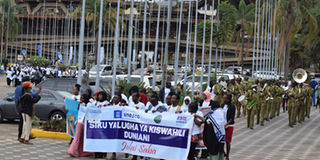Kenya to host the 2024 World Kiswahili Day

A procession matches from KICC to the Nairobi National Museum during the marking of the World Kiswahili Day on July 7. PHOTO| COURTESY
What you need to know:
- Key events will include Usiku wa Mswahili, with the climax being the World Kiswahili Day on July 7.
- The second World Kiswahili Day regional celebrations took place in Kampala, Uganda, in 2023.
Preparations are in top gear for Kenya to host the World Kiswahili Day for the first time this year.
Gender, Culture, the Arts and Heritage Cabinet Secretary Aisha Jumwa yesterday formed a National Organising Committee, comprising 17 members, to arrange for the third World Kiswahili Day celebrations on July 5 to 7.
Key events will include Usiku wa Mswahili, with the climax being the World Kiswahili Day on July 7.
President William Ruto is expected to be the chief guest during the celebrations, whose proposed venue is Mombasa, the minister said.
“Kenya has been granted the opportunity to host this year’s celebrations. We must do the necessary preparations and convince those who proposed our name that they made the right choice,” Ms Jumwa said. “I will ensure funds are made available for everything to run smoothly.”
One of the outcomes of the historic events, the Cabinet secretary said, would be the introduction of a National Kiswahili-Speaking Day.
“There’ll be a special day set aside when every Kenyan, including the President, judges in courts, civil servants and teachers will be expected to speak exclusively in Kiswahili.”
Regional celebrations
During celebrations by the East African Community (EAC) to mark World Kiswahili Day last year, Kenya was named the host of this year’s events.
The second World Kiswahili Day regional celebrations took place in Kampala, Uganda, in 2023.
Zanzibar hosted the inaugural event that was presided over by President Hussein Ali Mwinyi.
That was a year after the General Conference of the United Nations Educational, Scientific and Cultural Organisation (Unesco) , sitting in Paris, France, declared July 7 the World Kiswahili Language Day.
On the establishment of the National Kiswahili Council, which has been delayed since the Cabinet gave the nod in 2014, Ms Jumwa said the bill is at an advanced stage. She explained the reasons for the delay.
“It has taken a long after being presented to the Office of the Attorney-General, but that is because the bill has to be translated into Kiswahili,” she said.
“The bill has already been translated into Kiswahili, thanks to Prof Kimani Njogu, who volunteered to do it as a patriotic Kenyan and Kiswahili scholar.
“The council is a requirement by the EAC and Kenya cannot have the Kiswahili Council without the law.”
The EAC Treaty, Article 119, provides for the development and promotion of indigenous languages especially Kiswahili as a lingua franca of the region.




